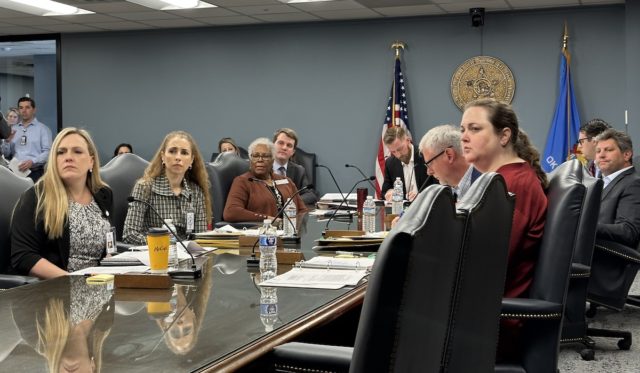
For the second meeting in a row, new appointee Marla Hill missed a State Board of Education meeting. Because she has yet to attend a meeting of the board, she is not actually a sworn-in member.
Asked after today’s meeting where Hill has been, State Superintendent of Public Instruction Ryan Walters said he did not know.
“Yeah that, I don’t know,” Walters said. “I don’t know why she wasn’t able to attend.”
Walters also said he does not know if Hill will be at the board’s next meeting, March 23.
The other six members of the board voted to approve revised academic standards for computer science, fine arts, and health and physical education today, but the approval drew some consternation from the committees tasked with creating the revisions owing to the removal of what Walters called “woke language” from the standards.
One of the members of the computer science standards committee, Levi Patrick, spoke during the public comments section of the meeting about a letter of support he submitted for the standards his committee crafted.
“They’re good standards,” Patrick said. “However, what I wanted to let you know is the letter of support that I submitted is for the version of standards that our computer science executive committee produced, and it has come to my attention just yesterday that there are revisions to the standards that were submitted by members of the board that change approximately 40 different items across the standards.”
Oklahoma state statute requires the State Department of Education to review academic standards every six years through a rigorous, months-long process that includes an executive committee, writing committee and draft committee made up of relevant stakeholders and public feedback on drafts of the new or revised standards.
“So, whenever we submit a letter of support for this work and sign off on the final product, it’s a product that we have a lot of confidence in,” Patrick said. “I am afraid today that the document in front of you is not the one that we submitted to you. Perhaps you already know that.”
Patrick said that in the computer science standards, state board members changed the word “culture” to “environment” throughout the standards and changed instances of the term “diverse” users to “different” users when discussing the need to build programs that a “diverse” group of users can operate.
When the board reached the agenda item during the meeting, Walters confirmed the changes before members voted on the standards.
“I appreciate the board’s due diligence on this,” Walters said. “We did make some slight changes. We took out any kind of woke language here. Our emphasis is to equip students to be ready for the workforce, not to be social justice warriors. This is an agency where ‘woke’ will go to die.”
After that, the board unanimously approved the revisions.
Besides the academic standards approvals, the board took relatively few actions today. During his comments at the beginning of the meeting, Walters gave some indication of new department initiatives.
Walters announced the creation of two new blue-ribbon committees. Walters said one will study prayer and faith in schools and the other will be a teacher advisory committee.
“The first will be put together because of a letter that I received from religious leaders and community leaders asking that I take a deep look at prayer in school and the role of faith in our K-12 schools,” Walters said. “I will form this committee of religious leaders and community leaders across the state to ensure that we’re doing all that we can do to make sure that our schools are as good as possible for our students.”
Walters declined to give details on the makeup of the new committees but did say that he would put them together in the coming month.
Walters reacts to bevy of education bills
After the meeting, Walters spoke with reporters about bills concerning education making their way through the Legislature.
Calling it an “addition” to vouchers, Walters praised HB 1935, which advanced out of the House on Wednesday. If it passes both chambers, it would give parents refundable tax credits for private or homeschooling options for their students.
“I thought it was a tremendous step in the right direction for the state of Oklahoma,” Walters said. “The speaker (of the House) did a tremendous job of getting a bill that gives us comprehensive school choice.”
On Wednesday, the House also advanced a $500 million education appropriation increase that would include an across-the-board teacher pay raise. Walters has advocated for merit-based teacher pay raises.
“We’ve done across-the-board pay raises before,” Walters said. “That’s the easy thing to ask for, but I was put in this position to do the hard thing. The hard thing is to ensure that everything we do is for the best of students. We have to start paying our teachers differently depending on how they perform.”
Walters declined to comment on a bill authored by Rep. Mark McBride (R-Moore) aimed at limiting the superintendent’s power. Just before it advanced out of the House Common Education Committee on Tuesday with only one vote against it, McBride said, “I want to put this gentleman in a box.”
When asked about it after today’s meeting, Walters responded with a common answer he uses when deflecting questions.
“My focus is parents, teachers and kids,” Walters said. “I haven’t really paid much attention to that.”
A spokeswoman for Gov. Kevin Stitt did not respond to a question regarding Hill’s absence from the first two State Board of Education meetings after her January appointment.





















